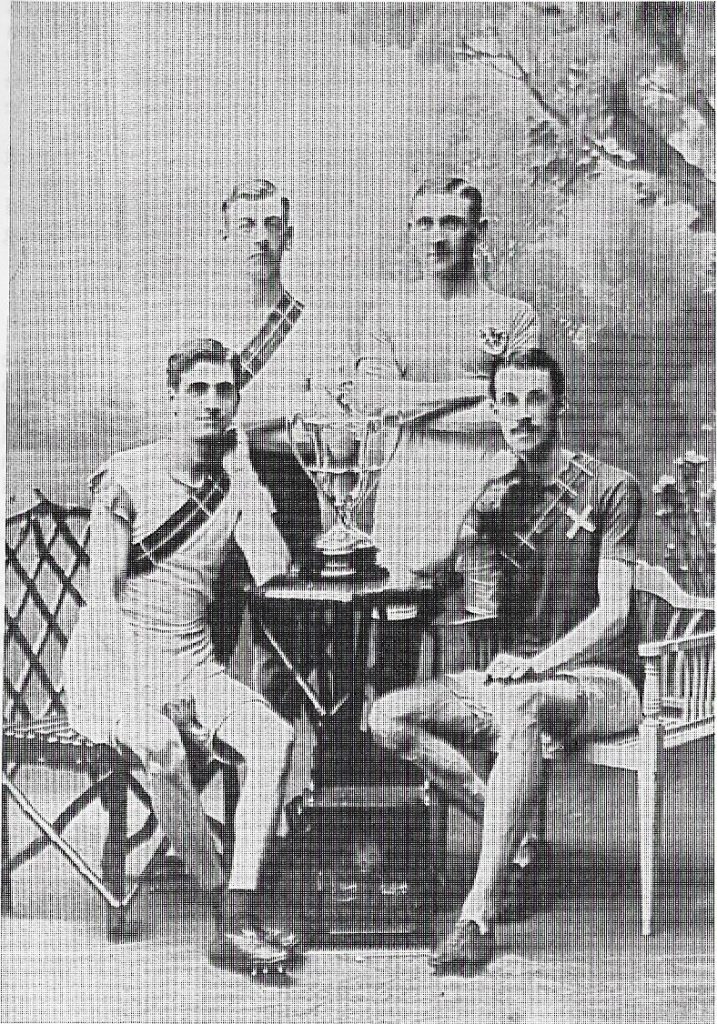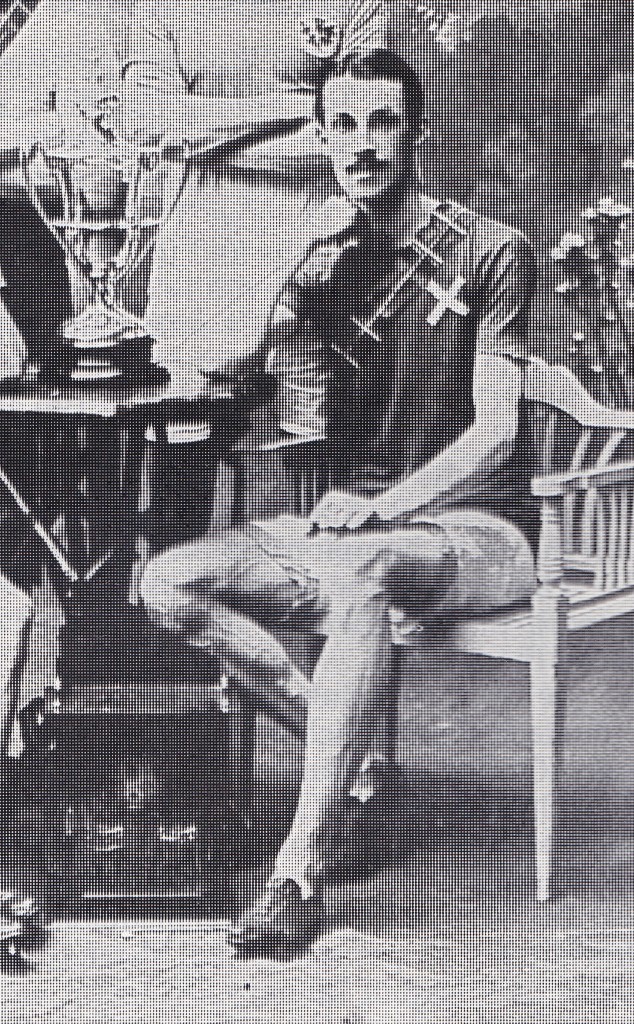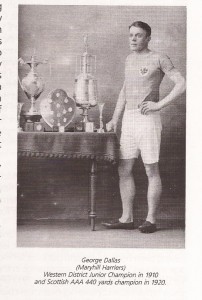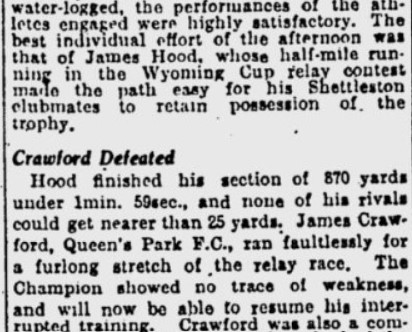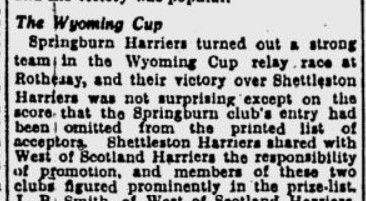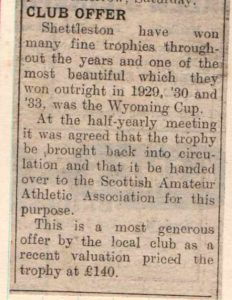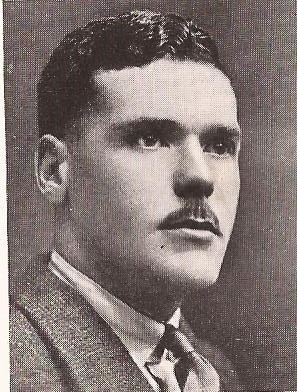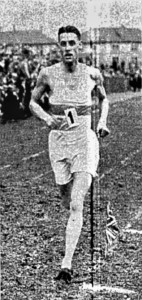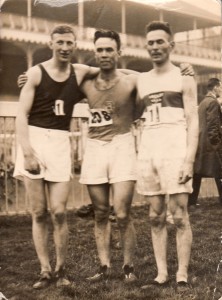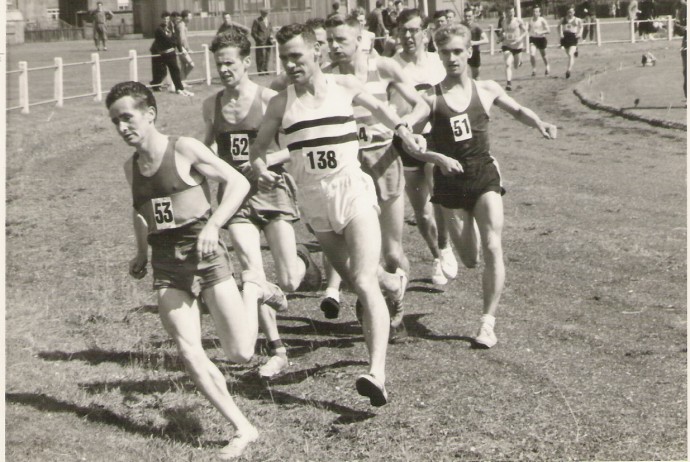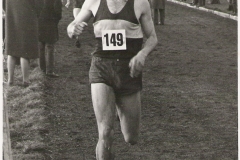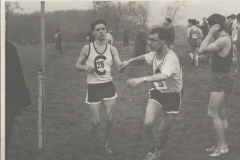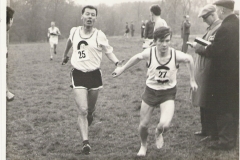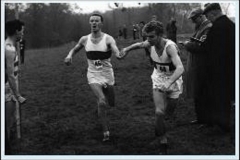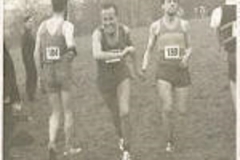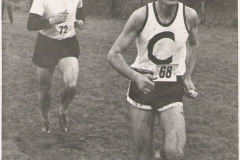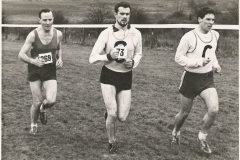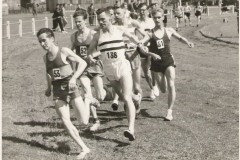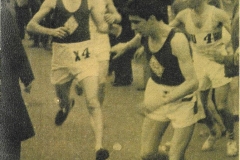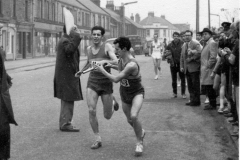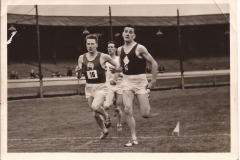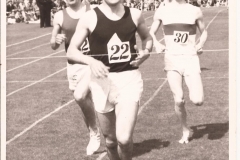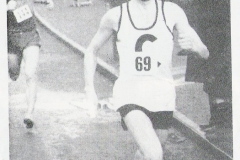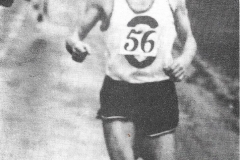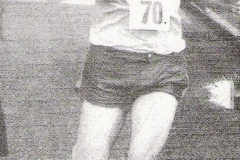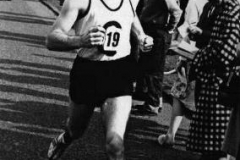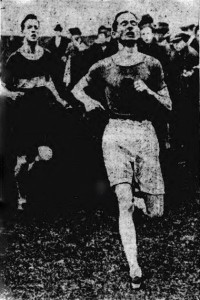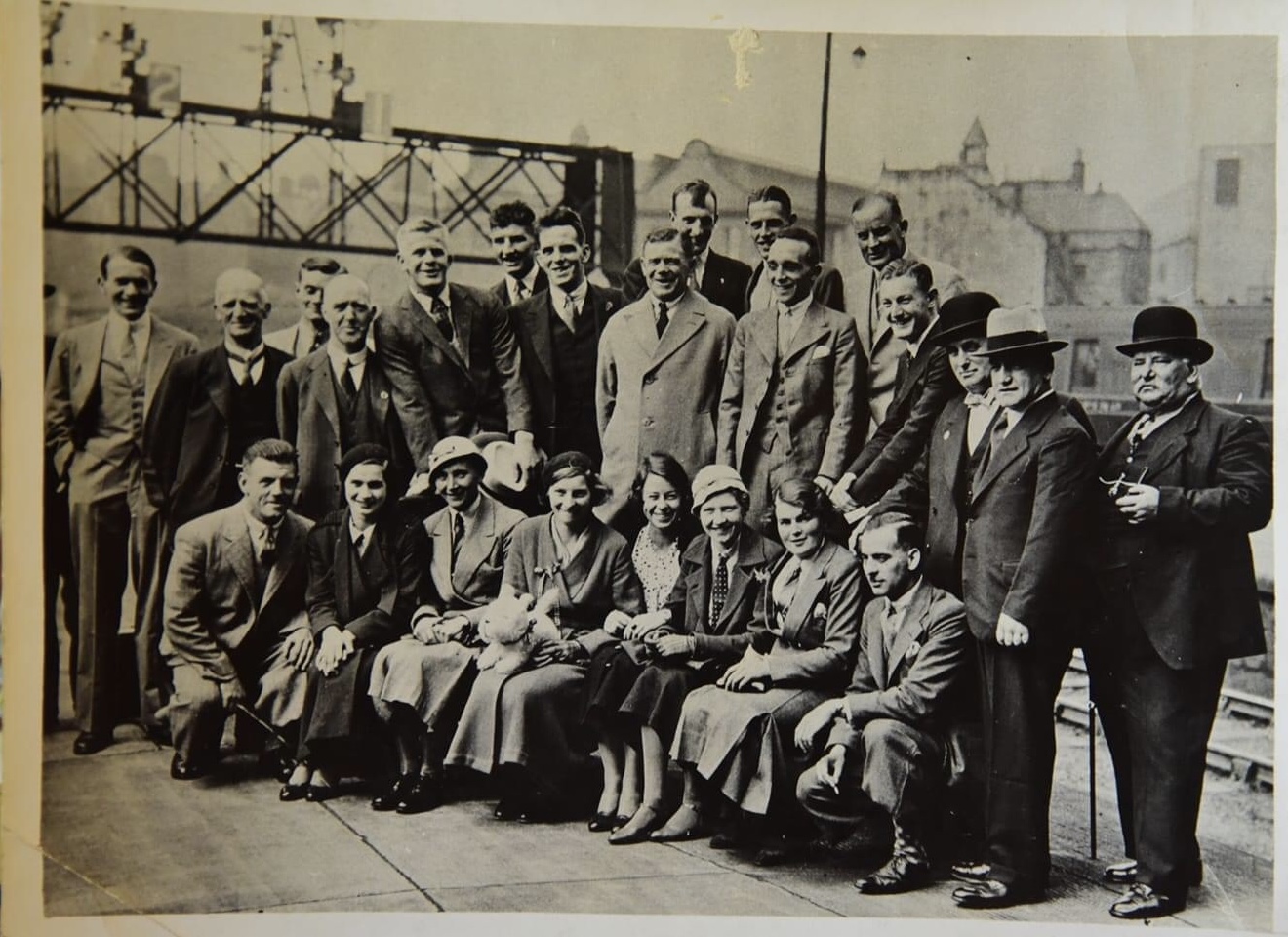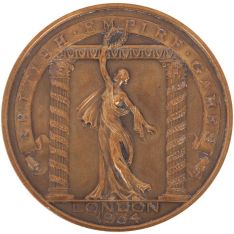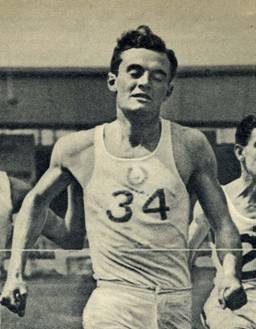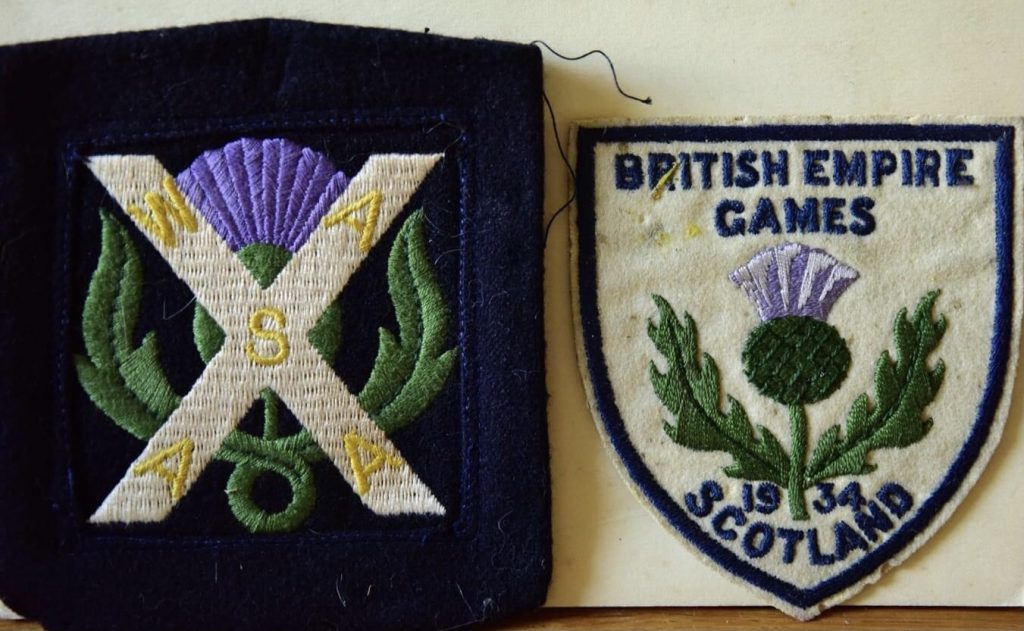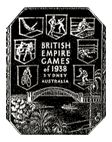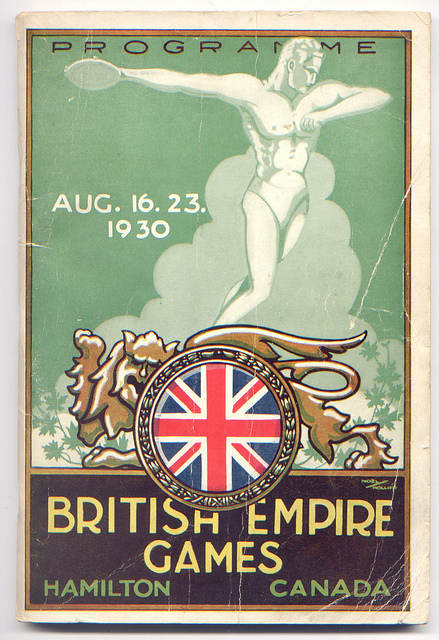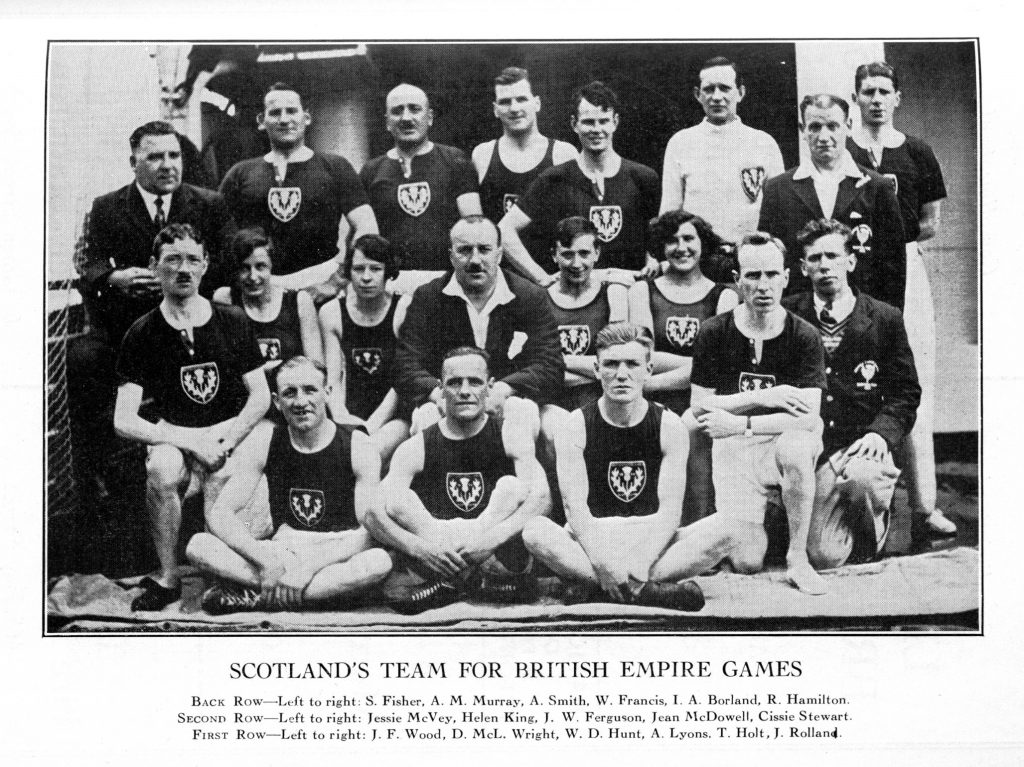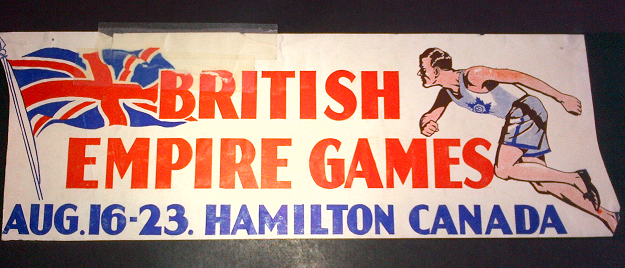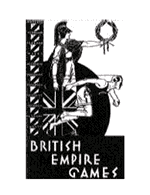Probably the biggest relay meeting held in Scotland was the inter-club championship help in Glasgow in June which had at least five relays and at one point six as an essential part of the programme.
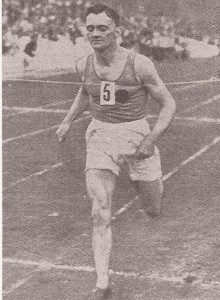
Bobby Graham
There have always been clubs in Scotland that do sterling work for the sport and then just disappear, almost without trace. Perhaps because the spark that created them has left the sport for whatever reason, perhaps because good as they were the club was in the shadow of a much bigger outfit whose sheer size and momentum prevailed. One such club was St Peter’s AAC which was based in the west end of Glasgow. The club competed well and contributed to athletics in the area but its real contribution was in the organisation of the big Inter-Club Meeting in June every year from 1928 to 1936.
Held on 2nd June, 1928 at Shawfield Park and before a crowd of 2000 people, there were to start with four open races – 100 yards handicap, 100 yards scratch, 440 yards handicap youths and half-mile handicap. The real business however was the inter-club contest which involved six relays, a four miles team race, and five field events. All branches were involved: sprinters, middle distance men, long distance runners, hurdlers, jumpers and throwers all were catered for. The trophy awarded was the “News of the World Challenge Trophy”. That particular newspaper sponsored many events across the length and breadth of Britain with the four multi-stage inter-city relays being the biggest and best. The event would settle into the second Saturday in June at Celtic Park, but the first was on the first Saturday.
It was reported on in the ‘Glasgow Herald’ as follows:
“It was generally expected that with the strength at their disposal, Maryhill Harriers would take pride of place at the meeting organised by that enterprising young club, St Peter’s. In the mid-distances with D McLean, WH Calderwood, W McRoberts, GP Inglis and A Mair they have a string that no other club can compete with at the moment, and winning four of the six relay flat events they won the trophy with a comfortabkle margin from the West of Scotland Harriers. The last-named club, for whom PW Brown confirmed his fine running of a week ago, were not over-weighted in the shorter distances, and won two events, the quarter mile and the mile, due in no small measure to smart understanding at the hand over.
The best race of the afternoon was the three miles team event. Here only one point separated Maryhill and Plebeian Harriers, and it was Donald MacLean’s final burst to the tape that earned the former their victory in this event. The mile champion ran also in the two miles, and here the expected duel between him and JD Hope did not materialise, as he took over with a lead of 20 yards and this was an impossible start for Hope to concede. Hope, making his first appearance of the season, showed good form, and A Nicolson, the Scottish champion, had a creditable effort in the weight of 42 ft 11 ins. Interesting too was the running of J Crawford, the Queen’s Park footballer. He has cultivated a new style which does not please the critics, and any increase in speed which he has made has been at the expense of smoothness.”
It will be noted straight away the some names appear more than once – in inter-clubs there are always demands made on athletes to ‘double up’ no matter which decade in athletics history we are speaking about. The quality of these athletes was very high indeed and the results of relays and team races are noted here.
440 yards relay (4 x 110): 1. West of Scotland (PW Brown, JG Scott, S Bernstein, AF Clarke). 2. Maryhill H; 3. Shettleston H.
880 yards relay (4 x 220): 1. Maryhill (WP Andreoli, DE Duncan, T McLean, R Kennedy); 2. West of Scotland; 3. Bellahouston H.
Mile Relay (4 x 440): 1. West of Scotland (AF Clarke, PW Brown, H Elliott, JD Hope); 2. Maryhill; 3. Shettleston.
Two Miles Relay (4 x 880): 1. Maryhill (W Roberts, WH Calderwood, D Sharp, D MacLean); 2. West of Scotland; 3. Cameron Highlanders
Four Miles Relay (4 x 1 Mile): 1. Maryhill Harriers (GP Inglis, T Cowan, WH Calderwood, D MacLean; 2. Garscube H; 3. Camerons.
480 yards hurdles relay (4 x 120): 1. West of Scotland (J Porteous, AF Clarke, T Clark, C Clark); 2. 2nd Cameronians
Three Miles Team Race: 1, Maryhill ( D MacLean 1, D McL Wright 4, WH Calderwood 5: 10 pts); 2. Plebeian (Combe 2, Gunn 3, Connolly 6)
Championship Cup: 1. Maryhill 20 pts; 2. West of Scotland 13 pts; 3. Cameronians 11 pts.
As far as the field events went, Maryhill only won the high jump while the Field Events Club won the hammer, 2nd Cameronians took the long jump, Glasgow Police won the putting the weight.
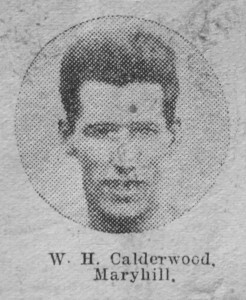
If 1928 was a success, 1929 was a revelation of the interest taken in an inter-club contest by Scotland’s athletes. The meeting was on 8th June and all cncerned were assessing the athletes form for the SAAA Championships which were to be held on 22nd June – just two weeks later.
It is pleasant to be able to record in these supposedly materialistic days, that 15 clubs, representing some 500 athletes, can be fund willing to take part in an inter-club contest where individual glory plays second part to the team spirit. It fell to the lot of St Peter’s, one of the youngest but one of the most enterprising clubs in the Western area, to discover this fact a year ago, and the success which attended their meeting at Scotstoun on Saturday demonstrated that the clubs were again more than anxious to participate in a meeting of this kind.
The competition throughout was keen and it was not until the very last event on the programme, the broad jump, that victory rested with Glasgow University by a bare margin of 2 points over Maryhill Harriers who were winners a year ago at Shawfield.
In a meeting of this kind it is somewhat difficult to assess individual values, but several of the candidates for championship honours acquitted themselves well, and we had the added satisfaction of seeing two Scottish champions, in James Crawford and KM Smith, in action for the first time this season. The Queen’s Park flyer, who ran in Shettleston’s colours in the two shorter relays, moved well enough to suggest he will be fit and ready for June 22nd. He was beaten in the final leg of the 440 relayn by JA Robb on practically equal terms, but an impartial survey of the race suggests that this was due as much to an indifferent change-over as to any inferiority in pace. ….
In the distance events the reserve strengt of Maryhill Harriers was apparent, their victory in the mile, two miles and four miles being earned somewhat easily. Donald MacLean, the Scottish champion, moved in freer style than in his previous races this season, and his mile was unofficially times at 4 min 41 3-5th sec, so that there is every hope that he may be back to form ere the championships. In these sections WH Calderwood, C Freshwater and J Hood all acquitted themselves well, and among the younger runners, none did better than A Fisher of West of Scotland. To defeat a tried performer like AH Blair was no mean feat. ….. “
The report goes on to discuss the three miles team race, won by Plebeian Harriers over Springburn by three points with Maryhuill thirs. Meeting relay results:
480 yards relay: 1. Glasgow University (Wright, Smith, Borland, Robb). 2. Shettleston H. 3. West of Scotland Harriers
Half-mile relay: 1. Glasgow University (Wright, Smith, Borland, Robb) 2. West of Scotland H; 3. Maryhill H
One Mile Relay: 1. Maryhill H (Duncan, Turner, Allison, Devlin); 2. Bellahouston H; West of Scotland H
Two Miles Relay: 1. Maryhill H (Herbert, McRoberts, Blair, Calderwood); 2. Glasgow University; 3. Shettleston H
Four Miles Relay: 1. Maryhill H (Maclean, Kellas, Blair, Calderwood); 2. Glasgow University; 3. Bellahouston H
480 yards hurdles relay: 1. 2nd Cameronians; 2. West of Scotland Harriers; 3. Shettleston H
Three Miles team race: 1. Plebeian Harriers (Gunn 1, Rayne 3, Lamont 11 = 14 points); Springburn Harriers (J Stevenson 4, R Allison 6, A Stevenson 7 = 17 pts; 3. Maryhill 28 pts.
Such was the emphasis on the inter-club nature of the event, that even the field events were included but with the results calculated as for distance track races. eg Maryhill won the high jump with the aggregate height of two representatives being 11′ 0″ (Smith 5′ 8″, Bulloch 5′ 4″) with the Field Events Club being second with a total height of 10′ 8″ and the 2nd Cameronians third with 10′ 2″. With three throws and two jumps, the field events were important in deciding the destination of the event. The News of the World Trophy in 1929 went to the University who had a total of 16 pts, from Maryhill on 14 pts and the Cameronians on 9 pts.
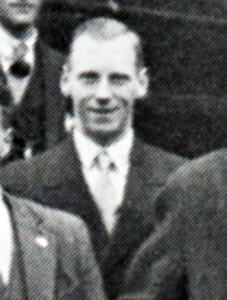
Walter Gunn, Plebeian Harriers
The St Peter’s Inter-Club contest was held on 14th June in 1930 at Celtic Park, and success continued unabated. Glasgow University again won the trophy, defeating Maryhill – but not until the last event, the javelin this time, was over. Edinburgh University won that from Glasgow University with Shettleston third and it was good enough to see the Glasgow students win with exactly the same scores and points difference as the previous year – their 16 points defeating Maryhill’s 14 by two with Edinburgh University two further adrift on 12 pts. The attendance was reported as ‘moderate’ but that was not the point of such an event. There were some changes in the format – one was that the Four Miles Relay became a One Mile team race. It was still part of the inter club but saved a fair bit of time on the programme! Results of the relays:
440 yards relay: 1. Maryhill H (Anderson, McBride, t McLean, Turner); 2. Shettleston H; 3. Glasgow University
880 yards relay: 1. Glasgow University (Murdoch, ? , Wright, Borland); 2. Maryhill; 3. Edinburgh University
Mile relay: 1. Springburn Harriers (McLaughlin, Scott, Mackill, Devon); 2. Glasgow University; 3. West of Scotland
Two Miles relay: 1. Maryhill (Muir, Blair, Calderwood, D MacLean); 2. Edinburgh University; 3. West of Scotland H
480 yards hurdles relay: 1. Edinburgh University (Decker, Campbell, Barker, Holmes); 2. Field Evcents Club; [GUAC second but disq)
One Mile Team Race: 1. Maryhill Harriers (MacLean 1, Muir 3, Blair 4); 2. Glasgow University AC; 3. Bellahouston
Three Miles team race: 1. Maryhill Harriers (D Wright 1, Muir 3, Robertson 4); 2. Bellahouston H; 3. Garscube H.
Glasgow University won the trophy largely because Maryhill Harriers got almost no points at all in the field events wheras the students picked a couple of firsts, a second and a third.
The changes referred to above were interesting in their own right:
a. open events had increased in number from four in the first match to eight this time round plus two cycle races.
b. The events were 100 yards, 440 yards (both handicaps), 100 yards junior scratch; 100 yards novice scratch;
c. There were three races for women, one of which was a relay -100 yards, 220 yards; 440 yards relay . Edinburgh University and Maryhill Harriers were the strongest women’s teams with Glasgow University also providing a placed runner.
d. Celtic Park had a concrete cycle track outside the cinder track and so for the first time it was possible to hold a 440 yards cycle race and a one mile cycle race without interfering with the state of the track.
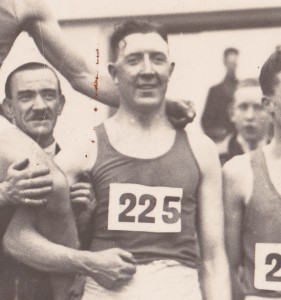
The meeting on 13th June 1931 was again held at Celtic Park and there were again innovations and changes to the format.
Results:
440 yards relay: 1. Maryhill H (Turner, McBride, Stewart, Hamilton); 2. Dublin Metropolitan Garda; 3. Shettleston H
880 yards relay: 1. Maryhill H (Turner, Brown, McBride, Hamilton); 2. Shettleston Harriers; 3. West of Scotland H
Mile Relay: 1. Maryhill H (A Edmiston, Lieut A Harvey, P Dolan, R Hamilton); 2. Springburn H; 3. Dublin Metropolitan Garda
Two Miles Relay: 1. Maryhill H (McNiven, Wilson, Calderwood, MacLean); 2. Springburn H; 3. Shettleston H
480 yards hurdles relay: 1. Dublin Metropolitan Garda; 2. Fied Events Club; 3. West of Scotland H
Mile Team Race: 1. Maryhill H (MacLean 2, Calderwood 4, Blakely 6); 2. Plebeian H; 3. Springburn H
Three Miles Team Race: 1. Maryhill H (Muir 4, Blakely 5, Blair 9); 2. Heriots FP; 3. Springburn H
Two Miles Junior Relay: 1. Plebeian H (Blackwood, Armstrong, Black, Illingworth); 2. Garscube H; Victoria Park.
Two things stand out here – one is the addition of yet another relay – the two miles junior event (4 x 880), which seems to prove the popularity of the format; and the arrival on the club scene of Victoria Park AAC. The club had been formed only one year earlier. We can go further and note that the events for women were now over 100 yards open, 100 yards (confined to St Peter’s), 220 yards, half mile and 440 yards relay. This time there were more clubs involved – Shettleston, Bellahouston and Maryhill were all represented. As for the contest – Maryhill won with 24 points, from Dublin Metropolitan Garda on 19 1/2 pts with Shettleston well back on 9 pts. Previously regarded as the unofficial club championship of Scotland, the entry of the Irish team maybe complicated things. Maryhill had made a clean sweep of the track events, bar the Junior Two Miles relay for which they had not entered a team and they competed better in the field events than the year before with 2nd in the broad jump and hammer, plus 3rd in the high jump and weight. The absence of the University teams was to be regretted since they had their own championships at Craiglockhart that same Saturday
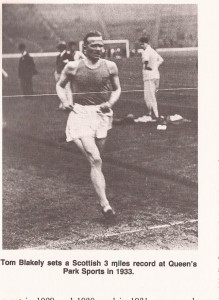
The Inter-club competition the following year was held on 4th June 1932, and was again at Celtic Park. It had moved about between the first three Saturdays in June sinceits inception because of the other events being held. The Queen’s Park Sports were on the first Saturday and St peter’s wanted to keep clear of that date, but if the Irish international was on the second Saturday, they had to move back a week. Or forward. The University championships were usually on the second Saturday of the month so it was sometimes better to go to the third Saturday. However, the report on the ’32 version started as follows: “The strength of the Glasgow University team in the field events made the Students’ victory in the inter-club contest at the St Peter’s AAC meeting at Celtic Park on Saturday afternoon much more decisive than was anticipated. They actually collected 17 of the 18 points at stake in this section and although Edinburgh were handicapped by the absence of their champion, RW MacKay, the relative placings of the two teams at the finish should give the teams every encouragement for their meeting in the inter-university contest at Westerlands on Saturday first. Glasgow University’s final tally was 30 points, Maryhill Harriers being runners-up with 18, while Edinburgh University and Springburn tied for third place with 5 points each. In only one of the ten events, the three mile team race, did Glasgow fail to score, and they never fell behind second place.”
440 yards relay: 1. Glasgow University (Stead, Clark, Kitchen and McCush) ; 2. Edinburgh University; 3. Bellahouston Harriers
880 yards relay: 1. Maryhill H (Brown, McBride, Bell, Dolan); 2. Glasgow University; 3. Victoria Park
Mile relay: 1. Glasgow University (Glen, Young, Barlow, Borland); 2. Springburn H; 3. Maryhiull H
Two Miles relay: 1. Glasgow University (Glen, Barr, Wynne Roberts, Murison); 2. Maryhill H; 3. Springburn H
480 yards hurdles relay: 1. Glasgow University (Selkirk, Souter, Taylor, Kitchin) walked over.
One Mile team race: 1. Maryhill H (Calderwood 1, MacLean 4, Muir 5); 2. Glasgow University; 3. Plebeian Harriers
Three Miles team race: 1. Maryhill Harriers (Blakely 1, DM Robertson 3, W Nelson 4); 2. Plebeian H; 3. Garscube H
There were two records set at the meeting – Tom Blakely of Maryhill set a new Scottish record for three miles of 14 min 38 1-5th sec and Constance Johnston, SWAAA champion set a new record for the half mile of 2 min 24 1-5th sec. The open track events were held but this time there were no cycle races at all and the two miles junior relay had been dropped.
“For the fourth time in the six years that have elapsed since the meeting was first instituted, Glasgow University won the inter-club contest held at Celtic Park on Saturday afternoon under the auspices of the St Peter’s club. This has come to be regarded as the unofficial all-round championship and a test of the strength of the clubs in track, field and heavy events. Let it be said that the Glasgow students by gaining first place with their total of 22 points fully deserved their claim to be the best team in Scotland, as in only one of the 12 events on the programme – the three miles team race – did they fail to secure points. They won four events (Mile relay, high jump, broad jump, javelin), finished second in three (880 yards relay, two miles relay and putt), their third placings being in 440 yards relay, 480 hurdles relay, one mile team race and hammer. “
Glasgow Police were second and Maryhill and Edinburgh University tied for third. Results:
440 yards relay: 1. Maryhill H (Turner, McBride, Bell, Brown); 2. Edinburgh University; 3. Glasgow University.
880 yards relay: 1. Maryhill H (Brown, Bell, McBride, Turner); 2. Glasgow University; 3. Springburn Harriers
Mile relay: 1. Glasgow University (Murray, Wright, Young, Glen); 2. Glasgow Police; 3. Springburn H
Two Miles relay: 1. Glasgow Police (Wilson, Lyons, Davie, Scott); 2. Glasgow University; 3. Maryhill H
One Mile team race: 1. Shettleston Harriers (Sutherland 2, McCubbin 3, Young 12); 2. Garscube H; 3. Glasgow University.
Three Miles team race: 1. Plebeian H (Tombe 1, Gunn 2, Armstrong 5); 2. Maryhill H; 3. Garscube H.
Although there was no team in the team race from Heriot’s FP, JF Wood was first to finish in the three miles in 15 min 7 3-5th sec.
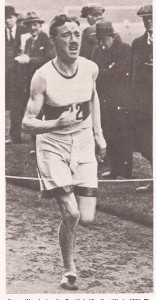
JF Wood, Heriot’s FP
16th June 1934: For the third year in succession and the fifth time since the inception of the event in 1928, Glasgow University in the inter-club contest held under the auspices of St Peter’s on Saturday proved themselves to be the best of the Scottish clubs in an all-round trial of strength in track, field and heavy events. They finished first of the twelve clubs competing, and in only two of the twelve events, the mile and the three miles team events, did they fail to register points. Their total of 22 points was taken from firsts in the 880 yards relay, 480 yards hurdles relay and the high jump, seconds in the 440 yards relay, one mile relay, two miles relay, high jump, putt and hammer, and a third in the javelin. Shettleston, who alone of the Harrier clubs have devoted much time to the field and heavy events, were a good second with 14 points, and it is to be noted that this section of the club, led by JK Braid and ER Walker, collected all but three of the total. Maryhill was third with 8 points, and Glasgow Police and West of Scotland tied for fourth with 7 points. It ios pleasant to see the last named, one of our oldest clubs, coming back into the limelight after several seasons of partial eclipse.”
Results:
440 yards relay: 1. Maryhill H (Turner, McBride, Brown, Williamson) ; 2. Glasgow University; 3. Bellahouston H
880 yards relay: 1. Glasgow University (Bishop, Stone, Robertson, Murdoch); 2. Maryhill H; 3. Glasgow Police
Mile relay: 1. Springburn Harriers (C Campbell, Carson, McKell, A Campbell); 2. Glasgow University; 3. West of Scotland H
Two Miles Relay: 1. Maryhill H (Graham, MacLean, Scholes, Calderwood); 2. Glasgow University; 3. Victoria Park
4 x 120 yards hurdles relay: 1. Glasgow University (Chassels, JA Kitchin, TH Souter, AS Kitchin); 2. Shettleston H; 3. West of Scotland
One Mile team race: 1. Plebeian Harriers (Gunn1, McGregor 4, Robertson 8); 2. Shawfield Harriers; 3. Shettleston H
Three Miles team race: 1. Garscube Harriers (Bennett 3, Lindsay 5, DB Brooke 7); 2. Shettleston H; 3. Springburn H.
In the field events, Shettleston Harriers won the shot and the javelin, Glasgow University won the broad jump West of Scotland won the high jump and Glasgow Police won the hammer event. It should be pointed out in defence of the Harrier clubs, that one of the reasons they did not embrace the field and heavy events was probably a lack of appropriate facilities. The Universities with exclusive use of Westerlands and Craiglockhart with equipment for all the events available on demand. They also of course had the time for training and in addition the actual work done by most athletes in the shipyards, factories and coal mines was more physically demanding than the life of most students. The university teams might well have won the championship in any case – they had some superb athletes – but the above factors (access to facilities, less time for training and a more physically demanding lifestyle) are offered in defence of the harriers.
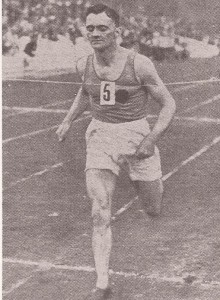
When St Peter’s held the event at Celtic Park on 8th June 1935, the Inter-Universities Championship was held at Craiglockhart in Edinburgh and this not only reduced the number of teams competing in Glasgow, but made the championship more open than it had been for several years. It was held on a wet and heavy track with nasty cross-winds but went ahead as usual. Results:
440 yards relay: 1. Garscube Harriers (Walker, J McIsaac, JT McIsaac, Pitcairn); 2. West of Scotland H; 3. Maryhill H.
880 yards relay: 1. Bellahouston H (Thomson, Gallagher, Lawn, Fraser); 2. West of Scotland; 3. Maryhill.
Mile relay: 1. Maryhill H (Terry, Cairns, Scholes, Morrison); 2. Victoria Park; 3. West of Scotland.
Two Miles relay: 1. Maryhill H (MacLean, Morrison, Osborn, Calderwood); 2. Victoria Park; 3. Plebeian H.
480 yards hurdles relay: 1. Bellahuston H (CG Gordon, Arnott, Wyper, OG Gordon); West of Scotland finished but were disualified.
One Mile team race: 1. Maryhill H (MacLean 1, Osborne 7, Calderwood 8); 2. Garscube H; 3. Plebeian H.
Three Miles team race: 1. Bellahouston H (Campbell 1, Lamb 2, Mowat 5); Maryhill H; 3. Plebeian H
Championship: 1. Maryhill H 18 pts; 2. West of Scotland 17 pts
*
There was no St Peter’s AC Inter-Club contes held in 1936 – or in 1937 or 1938 either. There were so many other meetings that they may have been crowded out of the calendar. There were only three Saturdays available in June: the fourth was always the SAAA championships, and on that Saturday there were a couple of minor meetings such as Lugar Sports. The first Saturday in June was always the Quen’s Park FC Sports which was a very attractive draw for athletes and the other regular meetings were the Singer’s Factory Sports at Clydebank and the Alloa meeting. It would have been hard for a club to get all their best men out for a meeting such as the inter-club on that date. The second Saturday was not any easier and that was traditionally the date for St Peter’s event: the Universities usually had their championships on that date and we hav seen how important their presence was for the Glasgow meeting. It was also unfortunate that the Babcock’s Sports had been going for five or six years by 1936 and it was offering the Empire Exhibition Trophy to the club with most points at the meeting which had two relays (4 x 100 and medley) and a track team race in addition to points for places in most events on the programme. It almost duplicated some aspects of the St Peter’s programme and it was easier to forward a team. And it was on the same day. On the third Saturday it was the Glasgow Police Sports: formerly a professional meeting it had joined the amateur ranks and proved to be very successful with some really good relays (normally two per programme). There was also an Edinburgh meeting on the third Saturday and the Dalmuir United FC had their sports on that date.
The situation for St Peter’s was one where they had to decide to either
a. Keep the date they had which clashed with the Universities champ[ionships, and, possibly more important, with Babcock and Wilcox Sports with the Empire Exhibition Trophy’; or
b. Move back a week and face the challenge of the Queen’s Park Sports which most athletes found quite attractive;; or
c. Move forward and clash with Glasgow Police Sports being held at Ibrox; or
d. Stop holding the meeting.
They were a small club, crowds were usually described as ‘moderate’ with no figures given, and they maybe just did not have the personnel or the drive to continue. However it turned out, there were no more inter-clubs held by St Peter’s. This was a pity because it was at a time when there were no track leagues of any form and whole club competition has a lot to commend it. It filled a gap, and right well did it do it.







